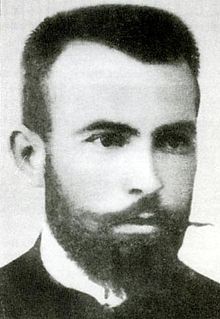
Back كرستي ميسيركوف Arabic كرستى ميسيركوف ARZ Крстэ Петкаў Місіркаў Byelorussian Крстэ Пэткаў Місіркаў BE-X-OLD Кръсте Мисирков Bulgarian ক্রস্টি মিজিরকভ Bengali/Bangla Krste Petkov Misirkov BS Krste Misirkov Czech Krste Misirkov German Κρίστε Μισίρκωφ Greek
Krste Petkov Misirkov | |
|---|---|
 Portrait of Krste P. Misirkov | |
| Born | Krste Petkov Misirkov 18 November 1874 Postol, Ottoman Empire |
| Died | 26 July 1926 (aged 51) Sofia, Kingdom of Bulgaria |
| Pen name | "K. Pelski", "Sekol" |
| Occupation | philologist, teacher, historian, ethnographer, translator and professor. |
| Citizenship | Ottoman, Moldavian, Russian, Bulgarian |
| Education | Doctor's degree of philology and history |
| Alma mater | Faculty of philology and history at the University of Saint Petersburg |
| Genre | history, linguistics, philology, politics, ethnography and analytics. |
| Subject | history, language and ethnicity |
| Notable works | On Macedonian Matters |
| Spouse | Ekaterina Mihaylovna - Misirkova |
| Children | Sergey Misirkov |
| Signature | |
 | |
Krste Petkov Misirkov (Macedonian: Крсте Петков Мисирков, pronounced [kr̩'stɛ pɛ'tkɔf mi'sirkɔf]; Bulgarian: Кръстьо/Кръстю Петков Мисирков; Serbian: Крста Петковић Мисирков;[1][2] 18 November 1874 – 26 July 1926) was a philologist, journalist, historian and ethnographer from the region of Macedonia.
In the period between 1903 and 1905, he published a book and a scientific magazine in which he affirmed the existence of a Macedonian national identity separate from other Balkan nations, and attempted to codify a standard Macedonian language based on the central Western Macedonian dialects. A survey conducted in the Republic of Macedonia (now North Macedonia) found Misirkov to be "the most significant Macedonian of the 20th century".[3] For his efforts to codify a standard Macedonian language, he is often considered "the founder of the modern Macedonian literary language".[4]
On the other hand, he was one of the founders of the pro-Bulgarian Secret Macedonian-Adrianople Circle established in 1900 in St. Petersburg.[5] In 1905 he began publishing predominantly articles, written from a Bulgarian nationalist perspective in the IMARO-affiliated press. In his diary written during the Balkan Wars, he espoused pro-Bulgarian views.[6] During the First World War, he became a member of the local parliament in Bessarabia as a representative of the Bulgarian minority there.[7] During the 1920s he encouraged the Macedonian Slavs to adopt a Bulgarian national identity. Misirkov returned to Macedonian nationalism for a period in 1914 and again in 1924 and 1925.[8][page needed] Misirkov died in 1926 and was buried in the Sofia Central Cemetery with the financial support from the Ministry of Education, as an honoured Bulgarian educator.
Because Misirkov expressed conflicting views about the national identity of the Macedonian Slavs at different points in his life, his national affiliation and legacy remain a matter of dispute between Bulgaria and North Macedonia. While Misirkov's work and personality remain highly controversial and disputed, there have been attempts among international scholars to reconcile the conflicting and self-contradictory statements made by Misirkov. According to historian Ivo Banac, Misirkov viewed both himself and the Slavs of Macedonia as Bulgarians, and espoused pan-Bulgarian patriotism in a larger Balkan context. However, in the context of the larger Bulgarian unit/nation, Misirkov sought both cultural and national differentiation from the other Bulgarians and called both himself and the Slavs of Macedonia, Macedonians.
- ^ Орган Историјског института, Српске академије наука и уметности · 38. том (1992). "Историјски часопис": 290.
{{cite journal}}: Cite journal requires|journal=(help)CS1 maint: numeric names: authors list (link) - ^ Михайлов, Иван. "Истинският образ на неуравновесения Кр. Мисирков".
- ^ http://star.dnevnik.com.mk/default.aspx?pBroj=1884&stID=4305 Македонија мора да го има Крсте Мисирков во своите пазуви Archived 21 September 2012 at the Wayback Machine
- ^ Loring M. Danforth (1997). The Macedonian Conflict: Ethnic Nationalism in a Transnational World. Princeton University Press. p. 50. ISBN 0-691-04356-6.
- ^ Записки за България и Руско-Българските отношения: бележки за събитията на деня (5 юли-30 август 1913 г.), Крсте Петков Мисирков, Редактор Цочо Билярски, Издателство „Анико“, 2011, ISBN 9789548247160; стр. 14
- ^ Al. Maxwell, “Slavic Macedonian Nationalism: From 'Regional' to 'Ethnic.'” Ethnologia Balkanica 11 (2007): 127–155, (139).
- ^ Dimitar Bechev, Historical Dictionary of North Macedonia, 2019; Rowman & Littlefield, ISBN 9781538119624, p. 208.
- ^ Panov, Mitko (2019). The Blinded State: Historiographic Debates about Samuel Cometopoulos and His State (10th-11th Century). BRILL ISBN 900439429X